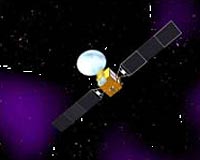 |
Cape Canaveral FL (SPX) May 31, 2010 Boeing has acquired the first on-orbit signals from the Global Positioning System (GPS) IIF-1 satellite, the inaugural spacecraft in a 12-satellite constellation that the company is building for the U.S. Air Force. The signals indicate that the spacecraft bus is functioning normally and ready to begin orbital maneuvers and operational testing. A United Launch Alliance Delta IV rocket launched the GPS IIF-1 satellite at 11 p.m. Eastern time on May 27 from Cape Canaveral Air Force Station. At 2:33 a.m., the satellite separated from the rocket's upper stage, and a ground station on Diego Garcia in the Indian Ocean received the first signals from the newest member of the Air Force's GPS satellite constellation. The Air Force 19th Space Operations Squadron and Boeing's Mission Operations Support Center in El Segundo, Calif., confirmed that the satellite is healthy. GPS signals from the spacecraft payload will be turned on for test purposes in the coming weeks. GPS is the U.S. Department of Defense's largest satellite constellation, with 30 spacecraft on orbit. The GPS IIF satellites will provide more precise and powerful signals, a longer design life, and many other benefits to nearly 1 billion civilian and military users worldwide. "The inaugural launch of the GPS IIF-1 is a milestone in Boeing's 30 years of support to the Air Force that goes back to the first days of this program," said Craig Cooning, vice president and general manager, Boeing Space and Intelligence Systems. "The new GPS IIF satellites bring key improvements, including a more jam-resistant military signal, a new civil signal to enhance commercial aviation and search-and-rescue operations, and significantly improved signal accuracy as more of these new satellites go into operation." The GPS IIF-1 satellite will undergo months of on-orbit tests, including functional testing of its payloads and end-to-end system testing to verify operability with older GPS satellites, ground receivers, and the ground control system. Boeing has production of the next 11 GPS IIF satellites well under way as it implements an innovative pulse-line manufacturing approach that will help deliver the satellite fleet on schedule. Adapted from Boeing aircraft and helicopter assembly lines, the Boeing GPS IIF pulse line efficiently moves satellites under development from one work area to the next in a steady, pulse-like rhythm. The second GPS IIF satellite is scheduled for launch later this year. Boeing's legacy with GPS includes development of the current GPS ground control infrastructure, the Operational Control Segment (OCS), which has supported an expanding set of GPS services and capabilities since 2007. Boeing also is a member of the Raytheon team that recently won a contract to build the next version of the ground segment, which will support current and future GPS satellites.
Share This Article With Planet Earth
Related Links Boeing GPS Applications, Technology and Suppliers
 China To Set Up Independent Satellite Navigation System
China To Set Up Independent Satellite Navigation SystemBeijing (XNA) May 24, 2010 China is developing an independent satellie navigation system called Beidou. It's the third country after the US and Russia to have such a system developed on its own. At the first China Satellite Navigation Annual Academic Conference in Beijing, the chief designer says the system will cover the whole world by 2020 and he hopes Beidou will become the most competitive navigation system on e ... read more |
|
| The content herein, unless otherwise known to be public domain, are Copyright 1995-2010 - SpaceDaily. AFP and UPI Wire Stories are copyright Agence France-Presse and United Press International. ESA Portal Reports are copyright European Space Agency. All NASA sourced material is public domain. Additional copyrights may apply in whole or part to other bona fide parties. Advertising does not imply endorsement,agreement or approval of any opinions, statements or information provided by SpaceDaily on any Web page published or hosted by SpaceDaily. Privacy Statement |